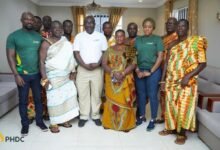Sanitation Ministry, Japanese team to partner to clean galamsey-polluted rivers

The Ministry of Sanitation and Water Resources and the Noguchi Memorial Institute for Medical Research (NMIMR) will collaborate with a team of environmental scientists from Japan to conduct research on polluted waters in Ghana, caused by activities of illegal-mining, known as galamsey.
This was the outcome of a meeting held in Accra last week, which was also to establish the state of pollution and proffer appropriate solutions to make the waters clean again.
The Japanese scientists which was lead by Prof. Dr Tomihisa Ohta of the Kanazawa University and Prof. Atsushi Umeda, President Trendy Science Company Limited, also met Vice President Dr Mahamudu Bawumia, the Minister of Sanitation and Water Resources, Mrs Cecilia Abena Dapaah, the Chief Executive of Ghana Gas, Dr Ben K.D Asante, and the leadership of the Water Research Institute, among other stakeholders.
Briefing the Ghanaian Times yesterday, the Ghanaian entrepreneur, Mr George Afriyie, who was formerly resident in Japan, said the “meeting with all the stakeholders involved have been positively fruitful.”
“Just like the Vice President Dr Bawumia, there was unanimous support because everybody was convinced there was a problem at hand that needed immediate attention,” he emphasised.
According to Mr Afriyie, the Japanese were primarily in Ghana to ascertain at first-hand information on the nation’s water bodies caused by the activities of galamsey, having received various samples from Professor Kwasi Kyei Amoabeng, a Ghanaian living in Japan.
“They briefed Prof. Amoabeng after conducting their own initial research per the samples which indicated that there were high density of toxic mercury in the water bodies which is dangerous to health.
The Japanese, who arrived in the country on February 20, last month, returned to Japan last Thursday, after 10 days. It was their first visit to Africa.
They are expected back in the country later in the year for the project.
Before their departure, the Japanese team visited the heavily-polluted Birim and Pra Rivers, which are reported to have high density of toxic mercury as well as the Volta Lake, to ascertain whether it is also affected.
The objective of the team is to make the rivers clean and hygienic again using micro-nano-bubble, unique bacteria and other cleaning technologies.
BY JOHN VIGAH





